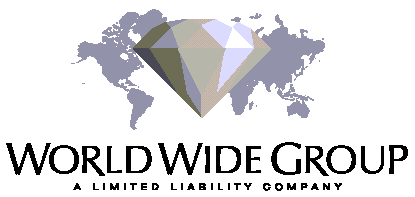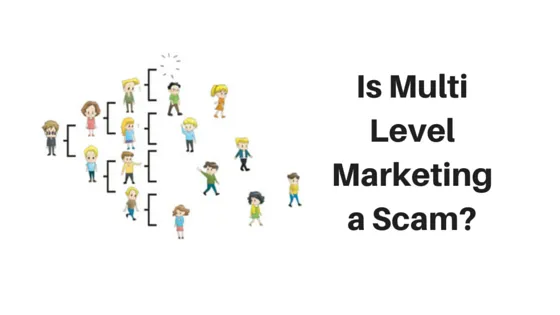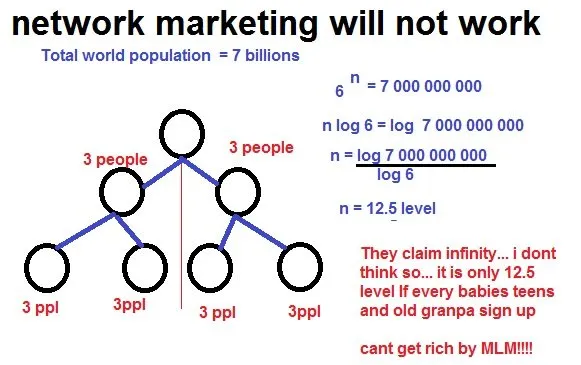
Your friend comes to you one day, breathlessly excited about a 'new business opportunity'. Their excitement is contagious and they seem really sure about it. They've only ever been trustworthy before, so it's not difficult for them to talk you into coming to a seminar to learn what it's all about.
Once you arrive, something feels off. One of those things you can't put your finger on. Everybody is wearing nice suits. The signs, the flashy graphics, the buzzwords. But you aren't sure what's going on until they describe their business model to you.

Be your own boss! An entrepeneur! Sure, you work under someone else in the sense that whoever recruited you gets a cut of your profits. But you also get a cut of the profits from anybody you recruit under you. "Isn't this...a pyramid scheme?" you ask. Some dude with super straight shiny white teeth laughs and assures you it isn't. "Every business is structured this way!" he assures you, "with one guy at the top and then successively more people in each layer under him."

...Indeed, that is true. He has many rehearsed answers like that one to counter your doubts. All of them designed to generalize all business as similar to this one, and carefully leaving out what makes it a scam.
You have to buy into it. They call it a "business license" or "startup cost", comparing it to the cost of starting a conventional business. That's why they frame it that way. Sometimes they will also use other metaphors, like airplane pilot and passengers, or boat captain and crew.

But that little detail gives it away. No legitimate business ever requires you pay anything to start. They pay you, even during training. This is also the way to spot fraudulent modeling agencies, as an aside: They will often ask for an exorbitant fee, promising it is normal and that you'll make it all back when your career takes off.

But that "normal fee" is what they were really after all along. You will never see a return on it. They make it seem inconsequential next to the future wealth they promise you'll earn, but how they actually make their money is by selling those starter kits/memberships, and often stuff like seminar tickets and motivational CDs as well.

The main business they present to you as their money maker is a red herring. Smoke and mirrors, to create the appearance of legitimacy. They make their money off the people who sign up to distribute, not off the products.
That little detail is carefully concealed behind a seemingly functional business and loads of useful advice about networking, how to organize effectively and emotionally affirming slogans.

After all, if you want to poison somebody, you mix a small amount of poison into a large amount of cake. Much of their business advice really is sound. You really can learn a lot about how to dress and otherwise present yourself, how to be professional and so on.
...But only so you will regard the organization positively, because of the small ways in which it has helped you. At the end of the day you will still struggle to break even, and more likely wind up losing money.
Worse, you're likely to lie to yourself and others about the fact that you're losing money because you don't want the people who tried to talk you out of it to have been right all along. So many still on the inside feign wealth in order to save face, living outside their means...which only ruins their finances faster.

How do MLMs get away with it? The small ones don't. They're shut down by the government once identified, hence why they are always changing the language they use to describe their business model. "Multi-level marketing" is now out of favor as people commonly recognize what it is. Now it's "network marketing" or "vector marketing". Many different masks, but the same thing underneath.

The other big factor in why some of these are still around is that Amway has high level employees in congress. Yes, really. Amway managed to get their own people into the political system to pass bills, usually tucked innocuously into others, which legalized their business model. Some changes were required to evade the federal definition of a pyramid scheme, but the end result is still that almost nobody who signs up for it ever makes any profit.

They're insidious, often using overtly religious language to inspire trust and recruiting people directly from their church. This is why so many Mormons are caught up in MLMs selling stuff like "essential oils" and why Utah is such a hotbed for MLMs.
They have a wide variety of tactics for disrupting efforts to expose them for what they are. Red herrings like "You're trying to say they don't make a good product?" Often they do, but of course that isn't the only measure of whether a company is legitimate. Or "You're anti-business", or "you're a negative person who holds others back".

They were coached to say these things by the CDs they buy from the company and the seminars they attend. They have been promised immense wealth in the future (so of course it's unfalsifiable and can be blamed on them if they don't attain it) and have already taken for granted that they will be rich. Someone whose happiness hinges on an assumption of this nature will often become volatile if you challenge the basis of it.

That's the worst part. It can turn your loved ones against you, and make them constantly spam their Facebook friends with product promotions or trick family members into "lunch" or "coffee" when really it's a recruitment attempt. All the while they will think you're the one being an asshole. That you're just a cynical, skeptical dick who doesn't know a golden opportunity when you see it.

It's also designed to spread. To make recruits want to spread it, thinking it's their own idea and in their own best interest. After all the more people "downstream" from them, either recruited by them or by people they recruit, the more money they can make. Not realizing this structure is just a mechanism designed to motivate people to rope as many other people into it as possible, none of whom will benefit.

They often have recruitment meetings at coffee shops like Starbucks, or Panera bread, or other "upscale" fast food places. They will be dressed in a nice suit and talking jovially, usually to a highschool student or college freshman. The best way to disrupt what they are trying to do is not to confront them.

This is an invitation to debate, and they will be very well practiced in defending the company. Instead wait for them to leave, then try to get their target alone. Ask him what company they were talking about. Google that company followed by pyramid scheme. If indeed that's what it is, show the target the results and urge him or her to research the matter on their own time, but crucially, not exclusively from info sources owned by that company or an associate.

If you encounter an article on Google 'innocently questioning' whether MLM = pyramid scheme or asserting that they are not, look at the website it's hosted on. Dollars to donuts it is the website of an MLM or one that they own. They astroturf Google results with stuff like this for the first page at least so potential recruits trying to do their own research will only encounter stuff supportive of the company.

Don't simply make a list of the names of these companies. That's in constant flux as they are shut down and new ones spring up to take their place. You've got to learn to recognize the anatomy of a pyramid scheme/multi-level marketing/vector marketing/network marketing scam.

In the same way vaccines train your immune system to recognize live viruses by exposing it to the dead, dissected remains of one, I hope this overview of how pyramid schemes are structured and how they operate will inoculate you against falling prey to one.
Stay tuned, tomorrow I'll be covering the endless variations on the classic Nigerian Prince 419 email scam.
Images mostly just clip art from GIS, but the mathematical breakdown of impossible projected MLM growth rate comes from skorminda.com